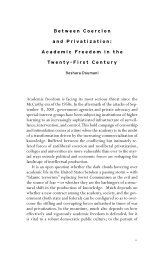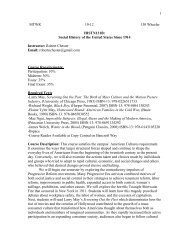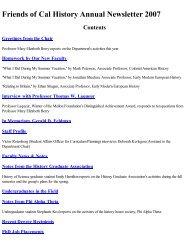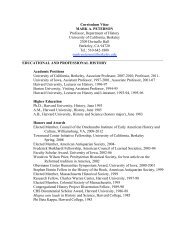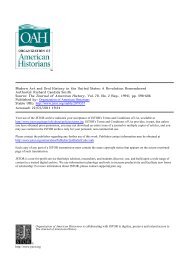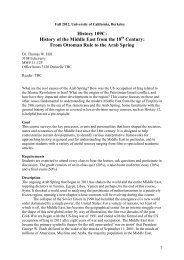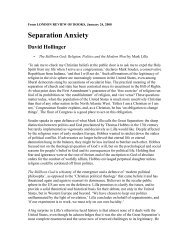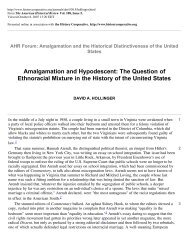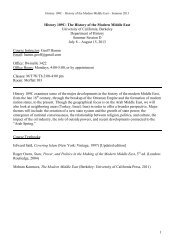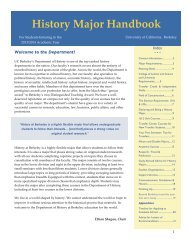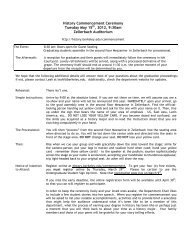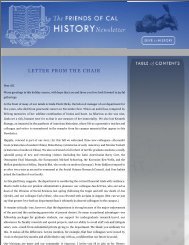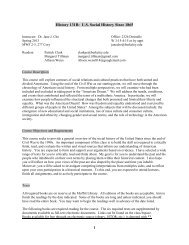My Grandmother and Other Stories: Histories of the Palestinians as ...
My Grandmother and Other Stories: Histories of the Palestinians as ...
My Grandmother and Other Stories: Histories of the Palestinians as ...
Create successful ePaper yourself
Turn your PDF publications into a flip-book with our unique Google optimized e-Paper software.
al-Amara (sou<strong>the</strong>rn Iraq), <strong>and</strong> his national identity is interchangeably described <strong>as</strong><br />
belonging ‘to <strong>the</strong> Ottoman nation’, <strong>and</strong> to ‘<strong>the</strong> Arab nation’ in o<strong>the</strong>r contexts, but never<br />
<strong>as</strong> a member <strong>of</strong> an ‘Islamic Nation’–a category that Jamal P<strong>as</strong>ha began to cultivate<br />
after 1917 to win Persian <strong>and</strong> Indian support for <strong>the</strong> Ottoman side. The ulama <strong>and</strong><br />
sheikhs were a particular object <strong>of</strong> scorn in Ihsan’s diary. Sheikh As’ad al-Shuqairi,<br />
<strong>the</strong> mufti <strong>of</strong> <strong>the</strong> Fourth Army from Akka, is described <strong>as</strong> a hypocrite when he travels<br />
to Istanbul with a number <strong>of</strong> religious bodies from Palestine to eulogize <strong>the</strong> Ottoman<br />
martyrs in Gallipoli <strong>and</strong> <strong>the</strong> Dardanelles.<br />
Only when Sherif Hussein <strong>and</strong> <strong>the</strong> tribes <strong>of</strong> Hijaz rebelled against Ottomans with<br />
British support did Ihsan express his vindication <strong>and</strong> pride <strong>of</strong> being an Arab. “Salute<br />
to <strong>the</strong> Hijazis. May God lead Hussein to victory, so that <strong>the</strong> blood <strong>of</strong> our martyrs in<br />
Beirut shall not flow in vain.” But he calls <strong>the</strong>m <strong>the</strong> ‘urban (‘Bedouin’) <strong>and</strong> he is<br />
aware that <strong>the</strong>ir revolt is not entirely altruistic. Among <strong>the</strong> re<strong>as</strong>ons he cites for <strong>the</strong><br />
rebellion is that Jamal P<strong>as</strong>ha had stopped paying protection money to <strong>the</strong> Hijazis for<br />
securing <strong>the</strong> Dam<strong>as</strong>cus Medina railway.<br />
The impact on Turkish-Arab relations <strong>of</strong> <strong>the</strong> progressive rupture in Ottoman identity<br />
can be fruitfully traced from <strong>the</strong> Turkish side in ano<strong>the</strong>r war diary–that <strong>of</strong> Falih<br />
Rifki, who w<strong>as</strong> <strong>the</strong> Jamal P<strong>as</strong>ha’s private secretary in Dam<strong>as</strong>cus <strong>and</strong> Jerusalem, <strong>and</strong> a<br />
contemporary <strong>of</strong> both Turjman <strong>and</strong> F<strong>as</strong>ih (by a strange coincidence, all three diarists<br />
were born in <strong>the</strong> same year, 1893). 64 Rifki’s observations are particularly valuable<br />
because he w<strong>as</strong> close to <strong>the</strong> events <strong>as</strong> <strong>the</strong>y unfolded, <strong>and</strong> because he w<strong>as</strong> a keen<br />
observer <strong>of</strong> Arab-Turkish relations inside <strong>the</strong> armed forces. In addition, Rifki w<strong>as</strong><br />
f<strong>as</strong>cinated by <strong>the</strong> dramatic manifestations <strong>of</strong> religion in moulding people’s lives in <strong>the</strong><br />
holy l<strong>and</strong>. In <strong>the</strong> following observation, he compares Jerusalem with Medina:<br />
The pilgrims in Jerusalem are no happier than <strong>the</strong> pilgrims at Medina. The<br />
people <strong>of</strong> Jesus are <strong>as</strong> hungry <strong>as</strong> <strong>the</strong> people <strong>of</strong> Muhammad <strong>and</strong> are equally<br />
doomed to live in misery. The only difference is <strong>the</strong> majestic décor <strong>of</strong> <strong>the</strong><br />
beggar in Jerusalem. Medina w<strong>as</strong> an Asiatic bazaar which h<strong>as</strong> turned<br />
religion into trade goods. Jerusalem is a Western <strong>the</strong>atre which h<strong>as</strong> turned<br />
religion into a play…I thought <strong>the</strong> priests <strong>of</strong> <strong>the</strong> Holy Sepulcher were wearing<br />
false beards. When <strong>the</strong>y bend down, one can see <strong>the</strong> bulge <strong>of</strong> <strong>the</strong>ir pistolholsters<br />
beneath <strong>the</strong>ir robes. 65<br />
In general, Rifki justifies Jamal P<strong>as</strong>ha’s campaign <strong>of</strong> repression against <strong>the</strong> Arab<br />
nationalists <strong>as</strong> an instrument <strong>of</strong> policy aimed at preserving stability <strong>and</strong> effective<br />
Ottoman administration. Fur<strong>the</strong>rmore, he seems to imply that <strong>the</strong> use <strong>of</strong> violence<br />
w<strong>as</strong> effective. He explains approvingly: “For Palestine we used deportation; for<br />
Syria, terrorization; for <strong>the</strong> Hijaz, <strong>the</strong> army. The circumspect Jews, waiting on <strong>the</strong><br />
co<strong>as</strong>t at Jaffa for <strong>the</strong> Balfour Declaration, lost no lives for its sake; not so much <strong>as</strong> an<br />
Jerusalem Quarterly 30 [ 49 ]



